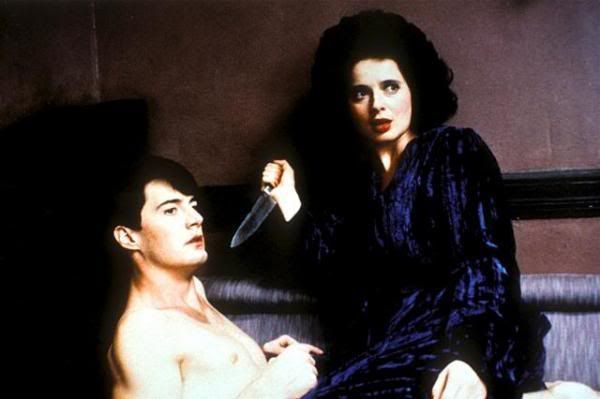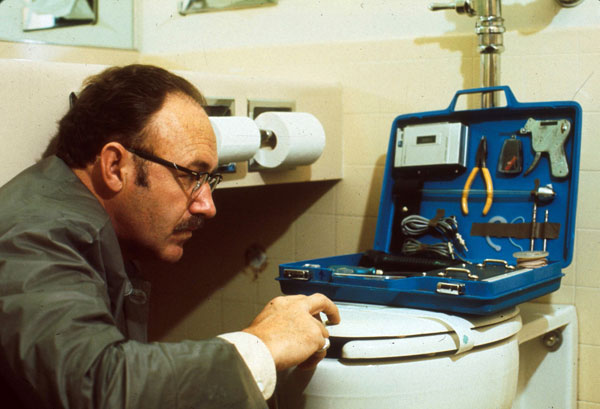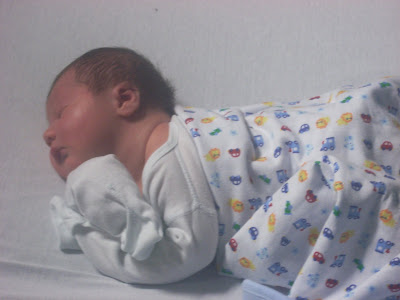
Monday, October 27, 2008
Who wants to eat the girl?
 The recent work of Dario Argento reminds of Trainspotting's Sick Boy and his theory that all great artists decline with age. Watching Argento, a master stylist, reduced to making thrillers involving internet poker makes one approach each new film with trepidation. This is especially true of Mother of Tears, the long-awaited conclusion of Argento's "Three Mothers" trilogy. The first two chapters, Suspiria and Inferno, are perfectly realized cinematic nightmares made by a more inventive, audacious Argento, and there was hope that Mother of Tears would mark a bold return to form. Unfortunately, Mother of Tears is a missed opportunity, a sometimes entertaining splatterfest that never comes close to the earlier films' macabre elegance.
The recent work of Dario Argento reminds of Trainspotting's Sick Boy and his theory that all great artists decline with age. Watching Argento, a master stylist, reduced to making thrillers involving internet poker makes one approach each new film with trepidation. This is especially true of Mother of Tears, the long-awaited conclusion of Argento's "Three Mothers" trilogy. The first two chapters, Suspiria and Inferno, are perfectly realized cinematic nightmares made by a more inventive, audacious Argento, and there was hope that Mother of Tears would mark a bold return to form. Unfortunately, Mother of Tears is a missed opportunity, a sometimes entertaining splatterfest that never comes close to the earlier films' macabre elegance.The film opens with the discovery of an ancient urn that, when opened by art student Sarah Mandy (Asia Argento), unleashes an evil force spreads chaos and sensless violence Rome and threatens the return of Mother Lachrymarum (Moran Atias) and a "second age of witches." An early scene that ends with a curator strangled with her own innards is impressively sick, and Sarah's subsequent escape from the museum promises some of the fairytale atmosphere that made Suspiria and Inferno so distinctive. Sadly, any sustained atmosphere is in short supply here - visually, Mother of Tears is flat and strangely generic. The baroque cinematography and bold color palettes of Argento's best work is replaced here with an perfunctory visual strategy straight out of a Sci-Fi Channel movie. The scenes of ordinary citizens committing random acts of violence were a perfect opportunity for Argento to recapture the hallucinatory mayhem that made Inferno so brilliant, but he eschews tension, even creative bloodletting, for matter-of-fact gore. Mother of Tears is a thuddingly literal-minded betrayal not only of the earlier films' marvelously sustained dream logic but of Argento's initial inspiration - shouldn't any work inspired by de Quincey at least aim for the uncanny?
The absence of any of Argento's strengths also makes his weaknesses more obvious. The setup could have been effective, but when the "age of witches" is represented by a bunch of sneering Goths led by a usually-topless Mother of Tears, it's more hokey than eerie. The cast, even the usually interesting Asia Argento, look bored as they go through the paces. And while Argento has done wonderful things with low-tech special effects in the past, CGI proves to be an uncomfortable fit - it's obvious and only draws further attention to Argento's distressingly anachronistic attempts to be hip and contemporary. Worst of all, Goblin's Claudio Simonetti trades the unnerving soundscapes of Deep Red and Suspiria for a loud, oppressive and completely forgettable score.
There are a few things to enjoy in Mother of Tears: there are a few impressively sickening moments, and the orgies Mother Lachrymarum hosts in an underground dungeon are impressively kinky. There's also some fun to be had in spotting Argento's recurring fetishes and obsessions - Asia has another questionable gratuitous nude scene shot by her dad, Argento's still working through tortured relationship with Daria Nicolodi (Asia's mother in the movie and real life), and monkeys are still threatening. And when Argento nods to his past successes - the recitation of the Three Mothers passage that opened Inferno, Asia wading through a pool of human decay exactly like the one in Phenomena, the self-consciously too-happy ending reminiscent of Opera - I got a slight buzz remembering those films. Unfortunately, those moments play less like a variation on familiar themes (as they often did to great effect in Inferno) and more like a slapped-together greatest hits collection for an underserved fan base. Mother of Tears is just good enough to hope that Argento has another classic up his sleeve, but bad enough to realize what an unlikely bit of alchemy that would be.
Thursday, October 23, 2008
Thomas Jerome Bemis
Sunday, October 19, 2008
Saturday, October 18, 2008
Top 101 (2008 Edition)

1. Blue Velvet (David Lynch, 1986)
2. The Shining (Stanley Kubrick, 1980)
3. Nashville (Robert Altman, 1975)
4. 2001: A Space Odyssey (Stanley Kubrick, 1968)
5. E.T. the Extra-Terrestrial (Steven Spielberg, 1982)
6. Vertigo (Alfred Hitchcock, 1958)
7. Raging Bull (Martin Scorsese, 1980)
8. There Will Be Blood (Paul Thomas Anderson, 2007)
9. Blade Runner (Ridley Scott, 1982)
10. Apocalypse Now (Francis Ford Coppola, 1979)

11. Carrie (Brian De Palma, 1976)
12. Boogie Nights (Paul Thomas Anderson, 1997)
13. Kill Bill vol. 2 (Quentin Tarantino, 2004)
14. Kill Bill vol. 1 (Quentin Tarantino, 2003)
15. Jaws (Steven Spielberg, 1975)
16. Taxi Driver (Martin Scorsese, 1976)
17. Alien (Ridley Scott, 1979)
18. The Man Who Fell to Earth (Nicolas Roeg, 1976)
19. Persona (Ingmar Bergman, 1966)
20. The Elephant Man (David Lynch, 1980)

21. Nosferatu: Phantom der Nacht (Werner Herzog, 1979)
22. Barry Lyndon (Stanley Kubrick, 1975)
23. My Own Private Idaho (Gus Van Sant, 1991)
24. Psycho (Alfred Hitchcock, 1960)
25. Badlands (Terrence Malick, 1973)
26. Halloween (John Carpenter, 1978)
27. A Clockwork Orange (Stanley Kubrick, 1971)
28. Children of Men (Alfonso Cuaron, 2006)
29. Lawrence of Arabia (David Lean, 1962
30. El Topo (Alexandro Jodorowsky, 1970)

31. The Empire Strikes Back (Irvin Kershner, 1980)
32. Jules and Jim (Francois Truffaut, 1962)
33. Dawn of the Dead (George A. Romero, 1978)
34. Chinatown (Roman Polanski, 1974)
35. Don't Look Now (Nicolas Roeg, 1973)
36. The Fly (David Cronenberg, 1986)
37. Aguirre the Wrath of God (Werner Herzog, 1972)
38. Fargo (Joel Coen, 1996)
39. The Godfather Part II (Francis Ford Coppola, 1974)
40. The Last Temptation of Christ (Martin Scorsese, 1988)

41. The Conversation (Francis Ford Coppola, 1974)
42. Eraserhead (David Lynch, 1977)
43. Dead Man (Jim Jarmusch, 1996)
44. 8 ½ (Federico Fellini, 1963)
45. The Thing (John Carpenter, 1982)
46. Touch of Evil (Orson Welles, 1958)
47. Ran (Akira Kurosawa, 1985)
48. Brazil (Terry Gilliam, 1985)
49. Schindler's List (Steven Spielberg, 1993)
50. GoodFellas (Martin Scorsese, 1990)

51. Mulholland Drive (David Lynch, 2001)
52. The Third Man (Carol Reed, 1949)
53. Inferno (Dario Argento, 1980)
54. All That Jazz (Bob Fosse, 1979)
55. Close Encounters of the Third Kind (Steven Spielberg, 1977)
56. Sid and Nancy (Alex Cox, 1986)
57. One Flew Over the Cuckoo's Nest (Milos Forman, 1975)
58. The Seventh Seal (Ingmar Bergman, 1957)
59. McCabe and Mrs. Miller (Robert Altman, 1971)
60. Cries and Whispers (Ingmar Bergman, 1972)

61. Blow Out (Brian De Palma, 1981)
62. Manhattan (Woody Allen, 1979)
63. Days of Heaven (Terrence Malick, 1978)
64. Dr. Strangelove or How I Learned to Stop Worrying and Love the Bomb(Stanley Kubrick, 1964)
65. Rashomon (Akira Kurosawa, 1950)
66. Citizen Kane (Orson Welles, 1941)
67. Once Upon a Time in America (Sergio Leone, 1984)
68. City Lights (Charles Chaplin, 1931)
69. Raiders of the Lost Ark (Steven Spielberg, 1981)
70. The Godfather (Francis Ford Coppola, 1972)

71. Last Tango in Paris (Bernardo Bertolucci, 1972)
72. The American Friend (Wim Wenders, 1977)
73. Betty Blue (Jean-Jacques Beneiex, 1986)
74. The Searchers (John Ford, 1956)
75. Harold and Maude (Hal Ashby, 1971)
76. Eyes Wide Shut (Stanley Kubrick, 1999)
77. Miller's Crossing (Joel Coen, 1990)
78. Magnolia (Paul Thomas Anderson, 1999)
79. Rushmore (Wes Anderson, 1998)
80. Orphee (Jean Cocteau, 1949)

81. Once Upon a Time in the West (Sergio Leone, 1968)
82. The Assassination of Jesse James by the Coward Robert Ford (Andrew Dominik, 2007)
83. Wings of Desire (Wim Wenders, 1987)
84. Y tu mama tambien (Alfonso Cuaron, 2001)
85. Heavenly Creatures (Peter Jackson, 1994)
86. No Country For Old Men (Joel and Ethan Coen, 2007)
87. Black Moon (Louis Malle, 1975)
88. Zodiac (David Fincher, 2007)
89. Stroszek (Werner Herzog, 1977)
90. Punch-Drunk Love (Paul Thomas Anderson, 2002)

91. Invasion of the Body Snatchers (Philip Kaufman, 1978)
92. Pat Garrett & Billy the Kid (Sam Peckinpah, 1973)
93. Belle de Jour (Luis Bunuel, 1967)
94. Ed Wood (Tim Burton, 1994)
95. Macbeth (Roman Polanski, 1971)
96. Phantom of the Paradise (Brian De Palma, 1974)
97. The Fountain (Darren Aronofsky, 2006)
98. Hedwig and the Angry Inch (John Cameron Mitchell, 2001)
99. The Big Lebowski (Joel Coen, 1998)
100. Eternal Sunshine of the Spotless Mind (Michel Gondry, 2004)
101. Popeye (Robert Altman, 1980)


